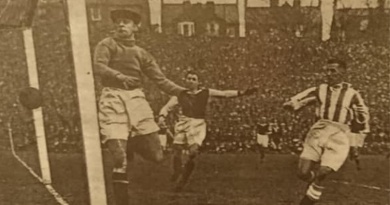The Brighton & Hove Albion 40 Note Fund
In the 2017-18 season, Brighton spent £60.30 million on players for their first team and development squads. In 2018-19, that figure rose to £79.52 million. In 2019-20, £69.35 million.
Three years, £209.17 million. And yet less than 20 years ago, Seagulls supporters were donating money to help fund signings and cover the wages of players like 44-year-old goalkeeper Dave Beasant. This is the story of the Brighton & Hove Albion 40 Note Fund.
The Albion were three months into the 2002-03 season and bottom of Division One when the 40 Note Fund came into being. Division Three and Division Two titles in back-to-back seasons under Micky Adams and then Peter Taylor had propelled Brighton from bottom tier to second in the space of two years.
Suddenly, the Albion had gone from competing against the likes of Kidderminster Harriers and Macclesfield Town to taking on clubs such as Nottingham Forest, Derby County and Leicester City. The jump in quality and budget was massive.
And Brighton had very little opportunity to generate money. Withdean held less than 7,000 people at the time and there was no multimillionaire pumping money in as we are now lucky enough to have with Tony Bloom.
It was Dick Knight trying to find a way to muddle through without a pot to piss in. And while the Albion’s meagre resources were enough to compete in the lower two divisions, against clubs with 30,000 capacity stadiums, millions in the bank and Premier League parachute payments, Brighton hardly stood a chance.
That became readily apparent in the opening weeks of the 2002-03 campaign. Martin Hinshelwood may have been a rookie manager appointed in panic who was clearly out of his depth, but he wasn’t helped by the players he had at his disposal.
While a club like Derby had Fabrizio Ravanelli on their bench, Hinshelwood was trying to score goals in the second tier of English football with a strike force of Shaun Wilkinson and Daniel Marney when injury ruled out Bobby Zamora.
After beating Burnley 3-1 on the opening day and then picking up a creditable 0-0 draw with Coventry City, Hinshelwood oversaw 10 consecutive league defeats.
By mid-October, his position had become untenable and so he was moved upstairs to become Director of Football. In his place came Steve Coppell and while there was no doubting Coppell’s ability as a manager, there was only so much the new man could do if he was expected to keep a side up with Marney and Wilkinson leading the line.
A group of Brighton supporters had an idea though. Ian Hart used his column in The Argus to present some rough calculations. If every one of the Albion’s 4,000 season ticket holders were willing to “chuck 40 notes” into a fund, it could raise £160,000 to be given straight to Coppell for reinforcements.
Not just any reinforcements either, but loan players specifically. Which is where The 40 Note Fund was clever. Brighton fans had run ‘Buy a Player’ campaigns before, where money raised went towards the transfer fees of Bert Murray in the 1970s and Rod Thomas in the 1990s.
Those behind The 40 Note Fund realised that while it was all very well fundraising to buy a player, it might not actually be that useful to Brighton or Knight.
Said player would come with a lengthy contract and, if he was of Division One quality, second tier wages. The 40 Note Fund could help buy a player, but it couldn’t help with the additional costs that brassic Brighton couldn’t afford either.
Raising £160,000 to allow Coppell to pay the wages of a temporary loan ranger who would otherwise be out of the Albion’s price range was a much more effective way of helping to boost the Brighton squad.
After Harty first mooted the suggestion in The Argus, an article appeared in the Seagulls Programme for the home match with Reading on November 30th 2002 explaining the concept of The 40 Note Fund.
“The 40 Note Fund is aimed at doing something different – and doing it with a very specific objective. Not to meet the general running expenses of the club, but to go straight to Steve Coppell and used to pay for some high-quality loan signing to keep the team from relegation.”
“Relegation is about more than gutters to stars stuff. For Brighton it’s about the more difficult issues like Falmer, too. Where, in all the morass of public inquiries and planning applications, being a top-flight team reinforces our need for a proper home.”
“Both Dick Knight and Steve Coppell have welcomed the help the Fund could bring and now we need your money! Whether it’s £40, or more, or less, anything you can afford is very welcome. Your help could make all the difference.”
Within three weeks of being launched, The 40 Note Fund had raised over £10,000 to help Brighton in their battle against the drop.
Hart said after the Fund’s blistering start to life, “We have had little old ladies donating £5 and one guy, who wishes to remain anonymous, because he does not want his missus to find out, donated £500.”
That first £10,000 was handed to Coppell in January. Within days it had a use. Michel Kuipers suffered a season-ending injury away at Norwich City in the FA Cup and the money was used to pay the wages of his replacement signed on-loan from Charlton Athletic, a certain Ben Roberts.
Roberts only spent at a month at Withdean, but his loan spell sparked a beautiful relationship between goalkeeper and club.
Roberts signed permanently in the summer of 2003 and recorded a club record of six clean sheets in a row as the Albion marched to promotion via the Division Two play offs in the 2003-04 season.
Injury forced his retirement after the 1-0 play off final win against Bristol City at the Millennium Stadium, but he made another return to the club in the summer of 2015 as goalkeeper coach.
Under Roberts’ guidance, David Stockdale was transformed from an overweight liability into one of the best keepers in the Championship.
Roberts also helped steer Maty Ryan through a tricky start to life in England, turning him into one of the most reliable top flight number ones. None of that might have happened had The 40 Note Fund not paid for Roberts to come to Brighton in the first place.
Once Roberts’ initial loan spell was up, The 40 Note Fund paid the wages of his replacement. There were more than few eyebrows raised when that turned out to be 44-year-old Dave Beasant, but Coppell’s judgement in bringing in a pensioner was spot on.
Beasant was excellent on and off the pitch in the final three months of the season. He pulled off some saves that defied his age and celebrated the 4-0 win over Watford in the last home game by performing The Worm in his penalty box when Charlie Oatway netted the Albion’s fourth in the 90th minute.
Any article involving Beasant also gives us an excuse to mention the brilliant incident when he was spotted lying on the floor of a West Street kebab shop, beer can in one hand and cigarette in the other, at 3am on a Wednesday morning after the 0-0 Withdean draw with Crystal Palace.
Next through the door thanks to The 40 Note Fund was Tony Rougier, who scored two goals in six games between February and March 2003 on loan from Reading.
Three players signed, all of whom made a favourable impression. The 40 Note Fund had been a success – but even that wasn’t enough to help the Albion avoid relegation.
Despite the best efforts of Coppell and his players, those 10 successive games lost under Hinshelwood at the start of the season was too big a hurdle for the Albion to overcome.
That wasn’t the end of The 40 Note Fund though. It would continue to operate through the 2003-04, 2004-05, 2005-06 and 2006-07 season.
Rather than asking supporters for cold hard cash, charity events such as quiz nights became the norm for raising money for Coppell and his successors to sign loan players.
Chris Iwelumo was the most notable of the subsequent 40 Note Fund players. His four goals in 13 games between March and the end of the 2003-04 campaign went a long way towards helping Brighton to promotion. He was of course the man who won the penalty successfully converted by Leon Knight in the playoff final.
The last player the fund was used to pay for was Joe O’Ceaurill, a right back signed on loan from Arsenal by Dean Wilkins in the second half of the 2006-07 season. Don’t worry if you can’t remember him as there is a very good reason for that – he was rubbish.
By the time the 2007-08 season got into full swing, there was no need for The 40 Note Fund anymore. Bloom was silently backing the Albion by paying for player purchases, including the January 2008 signing of a striker from Rochdale for £300,000. That fee paid for Glenn Murray was the biggest by Brighton for over 20 years.
With Bloom spending his millions, the 40 Note Fund was closed and the remaining money donated to Albion in the Community. The days of old ladies and anonymous husbands reaching into their pockets to help the Albion afford players were over.
Looking back at The 40 Note Fund nearly two decades on serves as a reminder of how far the Albion have come. Brighton can now spend £209.17 million in three years on players and no supporter is risking a divorce from his wife for chucking in fifty quid to contribute to Tony Rougier’s wages. It really is a different world.



